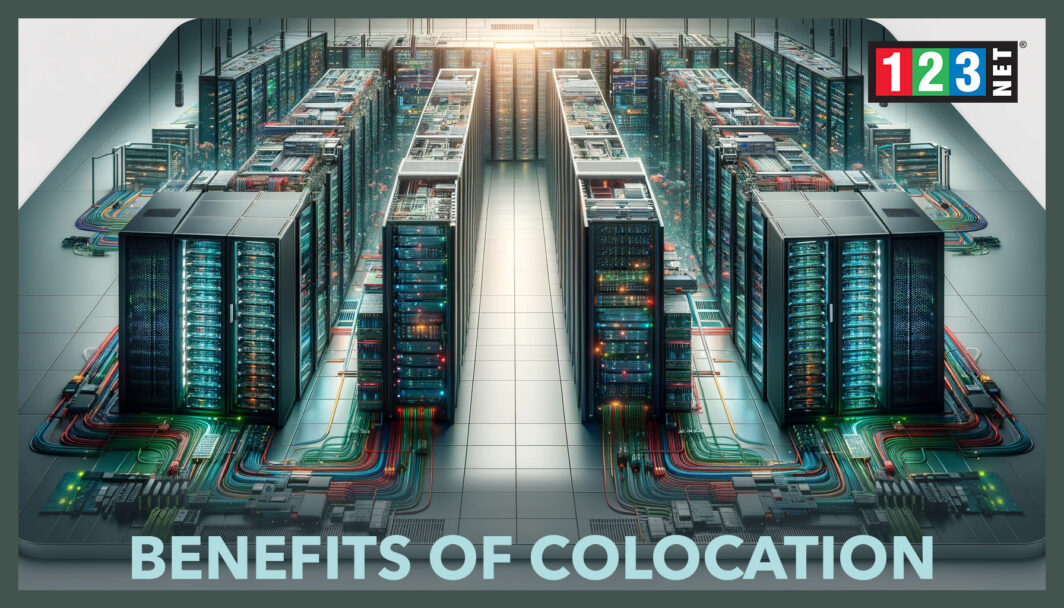
Introduction to Colocation
In the fast-evolving digital technology landscape, colocation emerges as a key strategy for businesses to optimize their IT infrastructure. By housing privately-owned servers and networking equipment in specialized third-party data centers, it offers a perfect blend of flexibility, efficiency, and robust security. As the digital landscape continues to evolve, an increasing number of companies are recognizing the substantial advantages of this approach. This guide explores the diverse benefits of colocation and its vital role in contemporary business strategies, showing how it streamlines IT operations and positions organizations for success in a tech-driven market with enhanced performance and reliability.
Cost Savings of Colocation
One of the standout benefits of colocation is the substantial cost savings it offers to businesses. When companies choose to house their IT infrastructure in a colocation data center, they effectively sidestep the hefty capital expenditures that come with setting up and running their own data center. This shift can lead to significant financial relief in several key areas.
Initial Costs Benefits
Firstly, the initial costs of constructing a data center are considerable . By opting for colocation, businesses avoid these upfront investments. Choosing colocation spares businesses the expense of building physical infrastructure, like acquiring land, constructing facilities, and installing hardware.
Operational Costs Benefits
Moreover, the operational costs of running a data center are not to be underestimated. These include the ongoing expenses of powering the facility, which involves not just the cost of electricity but also the installation and maintenance of power systems, such as generators and uninterruptible power supplies. Cooling systems, which are crucial for maintaining optimal operating temperatures for servers and other equipment, also contribute significantly to operational costs. Colocation data centers, with their economies of scale, can provide these services more efficiently and cost-effectively than individual businesses could manage on their own.
Maintenance Costs Benefits
Additionally, the maintenance of a data center is a continuous expense. This includes regular hardware upgrades, repairs, and the employment of specialized staff to oversee operations. Colocation facilities, managed by teams of experts, alleviate businesses from the burden of these tasks, allowing them to redirect their focus and resources towards core business activities.
Billing Benefits
Perhaps one of the most appealing aspects of colocation is its billing model. Businesses only pay for the space and resources they actually use. This model offers a level of flexibility that is particularly advantageous for businesses with fluctuating needs, ensuring that they are not locked into paying for unused space or resources. This approach to budgeting for IT needs allows for more precise and efficient financial management, making colocation a financially astute choice for businesses looking to optimize their IT infrastructure costs.
Reliability and Uptime of Colocation
Colocation providers are well-known for their commitment to ensuring high availability and continuous operation of IT infrastructure. This commitment is often to benefit through robust uptime guarantees, typically outlined in Service Level Agreements (SLAs). These guarantees are a cornerstone of the value proposition offered by colocation services, as they directly address one of the most critical concerns for any business reliant on digital systems: the need for uninterrupted access to IT resources.
Redundant Power Supplies for Colocation:
One of the key elements contributing to these uptime guarantees is the presence of redundant power supplies. Colocation facilities are designed with multiple layers to benefit the redundancy in their powerful infrastructure. This includes having multiple power sources, such as connections to different power grids, and on-site power generation capabilities like diesel generators. These facilities ensure that in the event of a grid power failure, there is an immediate switch to an alternate power source, thus maintaining continuous power supply to the servers and networking equipment.
Backup Generators for Colocation:
Backup generators play a pivotal role in the power redundancy plan. These generators are capable of providing long-term power backup, ensuring that the data center can remain operational even during extended power outages. Regular testing and maintenance of these generators are part of standard operational procedures at colocation facilities, ensuring they are ready to function as needed.
Advanced Cooling Systems for Colocation:
Maintaining an optimal operating temperature is crucial for IT equipment. Colocation facilities invest in advanced cooling systems that are designed to operate continuously and efficiently. These systems are often redundant as well, ensuring that if one cooling unit fails, others can take over without impacting the overall environment. This is critical because excessive heat can lead to hardware malfunctions and reduced performance.
Overall Reliability for Colocation:
Redundant power, backup generators, and advanced cooling in colocation centers greatly boost reliability, minimizing downtime and protecting the business’s reputation from customer trust issues and financial losses.
Enhanced Security Measures of Colocation
Colocation data centers prioritize security due to the value and sensitivity of the data and infrastructure they house. These facilities implement a multi-layered approach to security, encompassing both physical security measures and advanced cybersecurity protocols. This comprehensive strategy is designed to protect against a wide range of threats, from physical intrusions to sophisticated cyber attacks.
Physical Security Measures for Colocation:
- Biometric Access Controls: Colocation centers use biometric security like fingerprint or retina scans to control access to sensitive areas.
- Surveillance Systems: High-definition surveillance cameras are strategically placed throughout the facility, monitoring all activities 24/7. These cameras act as both a deterrent and a means of quickly identifying and responding to security breaches. The footage is often stored for a considerable period, allowing for retrospective analysis if needed.
- Physical Barriers: Colocation facilities feature reinforced walls, secure entry, and bulletproof glass to prevent unauthorized physical access. The barriers designs to withstand various forms of physical attack, thereby protecting the infrastructure inside.
- Security Personnel: Trained security personnel are present on-site around the clock. The guards conduct regular patrols and train to respond to security incidents effectively.
Cybersecurity Protocols for Colocation:
- Firewalls: Advanced firewalls protect the network, monitoring and controlling traffic based on security rules.
- Intrusion Detection Systems (IDS): These systems design to detect any unauthorized access or anomalies in the network. They continuously monitor network traffic and alert administrators of suspicious activities, allowing for rapid response to potential threats.
- Regular Security Audits and Updates: Colocation providers conduct regular security audits to identify and rectify any vulnerabilities. They also ensure that all software and security protocols are up-to-date, protecting against the latest cyber threats.
- Data Encryption: To protect data during transmission, many colocation centers use advanced encryption protocols. This ensures that even if data intercepts it remains unreadable to unauthorized parties.
Colocation Features
Scalability and Flexibility of Colocation:
Colocation is a dynamic solution that benefits the evolving requirements of businesses. As companies expand or face variable operational demands, they need infrastructure that can adapt swiftly. Colocation data centers offer adaptable, scalable solutions, allowing businesses to adjust space, power, and cooling resources to their needs. This flexibility lets businesses start small and scale up without significant initial investment, and adjust resources for fluctuating demands.
Optimized Performance of Colocation:
Colocation centers are hubs of technological advancement, equipped with the latest in high-performance computing and networking technology. Businesses using colocation services gain access to advanced IT infrastructure without the major capital expenses of purchasing and maintaining it. The regular updates and maintenance undertaken by colocation providers mean that businesses can rely on consistent and high-level performance. This is especially important for operations that are data-intensive or mission-critical, where any performance lag can have significant repercussions.
Ease of Cloud Transition for Colocation:
For businesses contemplating a transition to cloud computing, colocation offers a benefit of an intermediate step. It offers a controlled environment for physical servers while accessing colocation providers’ cloud connectivity. This hybrid model blends cloud benefits like flexibility and scalability with physical hardware control and security. This approach eases the transition to cloud services, making it less disruptive and allowing for a more gradual migration strategy.
Compliance and Standards of Colocation:
Colocation facilities adhere to critical standards like HIPAA, PCI DSS, and SOC 2, required in regulated industries. Companies, especially smaller ones, can offload compliance complexities to the provider. It also reduces the risk associated with non-compliance, which can include heavy fines and reputational damage.
Resource Allocation and Innovation of Colocation:
Colocation partnership shifts focus to growth and innovation, reducing IT infrastructure management. This reallocation can lead to new products, process improvements, and other initiatives that drive business success. IT teams, in particular, can shift from routine maintenance tasks to more strategic, value-added activities. This shift significantly boosts innovation and market responsiveness by freeing up resources for high-return investments.
Environmental Considerations For Colocation :
Colocation data centers are increasingly adopting environmentally friendly practices, that benefit with global sustainability efforts. Energy-efficient practices like green energy, advanced cooling, and optimized server use reduce the carbon footprint. Businesses can have eco-friendly practices without the need to invest directly in green technologies themselves. This alignment with sustainability is vital for businesses, contributing to corporate social responsibility and a positive brand image.
FAQs Colocation Benefits
- How does colocation improve disaster recovery? A: Colocation facilities offer enhanced disaster recovery capabilities. With robust backup, power redundancy, and high connectivity, these centers ensure quick recovery and business continuity.
- Can colocation reduce energy costs? A: Yes, colocation can significantly reduce energy costs. These facilities prioritize energy efficiency, often outperforming in-house data centers in effectiveness and cost-efficiency.
- How does colocation support business growth? A: Colocation supports business growth by offering scalable and flexible IT infrastructure solutions. This enables businesses to scale their IT resources with growth, without major capital investment in their own data center facilities.
Conclusion: Benefits of Colocation
Colocation stands out as a strategic solution for businesses looking to enhance their IT infrastructure. It offers a blend of cost efficiency, reliability, security, scalability, and compliance, all crucial for the modern business landscape. Choosing colocation allows companies to concentrate on their core competencies and innovation, while experts handle data center complexities. As the digital landscape evolves, colocation continues to be essential in aiding businesses to achieve technological and operational excellence.




